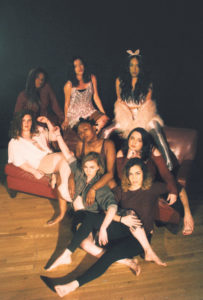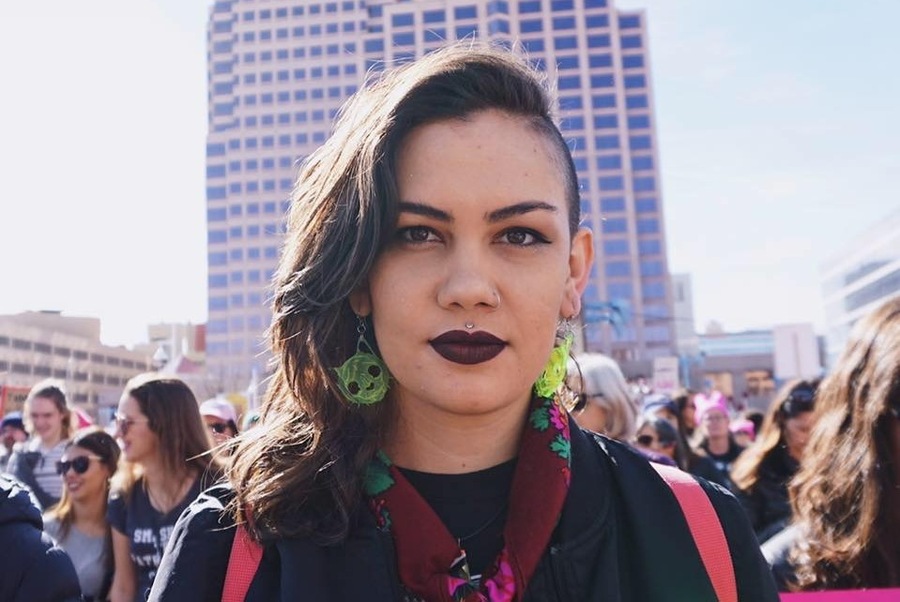Native American performer, poet, congresswoman’s daughter, empath, stage manager, activist: Somáh Haaland has many identities. But it is what she does that most embodies who she is. Her belief in other people and support for expanding their opportunities reminds us all that a little bit of work can go a long way toward making the world a more equitable place.
Before the COVID-19 pandemic began its rampage across the country in March, Haaland was working as a production assistant on a Netflix show in New York, charging walkie-talkies and taking inventory. Now she’s collecting donations for Indigenous communities, teaching in an online circus camp for children, and advocating for change on social media.
After returning home to Albuquerque, N.M., Haaland started working at two nonprofit organizations that do mutual aid work for the Indigenous population in the state. The organizations, Seeding Sovereignty and Pueblo Action Alliance, are collecting COVID-19 resources and relief aid for the Navajo Nation and the 19 pueblos that stretch from Taos to the Arizona state line.
“Nobody has enough resources,” Haaland said, referring to the outbreak within the Navajo Nation that led to the highest infection rate per capita in the United States. “People don’t realize that in a lot of Native communities, there are multiple generations living under one roof. Elders carry the wisdom and the stories and the vital information that makes each tribe and community what it is, and that is the most vulnerable population.”
Haaland faults the gaps in the foundational systems of the U.S. for the pandemic’s effect on Native populations—similar gaps to those that drove the Black Lives Matter movement to a tipping point in recent weeks.
“It ties into the whole privilege thing,” Haaland said. “People just assume that everyone in America lives the same way they do. And that’s just not true.” She recently wrote an op-ed for Medium about racial privilege and assumption.
Haaland is from Pueblo of Laguna, about 40 miles west of Albuquerque. Her mother, Congresswoman Deb Haaland, was one of the first Native Americans to serve in the House of Representatives, alongside Kansas’s Sharice Davids; both were sworn into office in 2019. “From a very young age, she instilled in me a sense of wanting to do the right thing and make the world a better place,” Haaland said of her mother. “I get to watch her create this ripple effect of change throughout several communities.”

But life wasn’t always campaign buttons and speaking out against the current administration. The Haalands moved often when Somáh was growing up, she said, and she attended nine different elementary schools.
It was during a stint in Santa Monica, Calif., when she was 5 years old, that Haaland took classes at the Santa Monica Playhouse and acted in a few short films through the American Film Institute, sparking her love for performing. Moving so much allowed her to participate in performing arts programs that wouldn’t have been available to her on the reservation. Haaland graduated from Albuquerque High School before attending the theatre arts program at the University of New Mexico.
“Having that kind of flexibility and not holding onto things too tightly, I think, is what helps me stay afloat in times like this,” Haaland said.
Last year she became a satellite member of the Tricklock Company, whose 2020 Revolutions International Festival was shut down in March when the pandemic reached New Mexico.
‘The first time I saw Somáh on stage, I was impacted by her vulnerability,” said Juli Hendren, executive director of Tricklock. “She really lets you come inside. As I got to know her, I realized that she is like that in everything she does. It takes an enormous amount of courage to be that accessible, but it is also what makes her an important voice in her community.”
In addition to community outreach, Haaland has continued to create art during the pandemic. She had been cast in a staged New York City reading of Arianna Afsar’s new musical Jeannette, which was postponed, but she did participate in Tricklock’s Reptilian Lounge late-night variety show in June, cohosting the pride edition with company member Laura Hosek. The online show raised money for the National Black Justice Center Coalition.
With the Black Lives Matter movement spurred by the killing of George Floyd, Haaland, like many others, is taking time to unpack racial bias in the theatre industry and the wider arts community. She calls attention to intersectionality within social justice issues, when multiple marginalized identities are shown to put individuals at greater danger (particularly Black trans women).
“I think it’s time that Native people—Black, Indigenous, people of color—are given more opportunities to use their voice, because we have a lot to say,” Haaland said, referring to the disproportionate representation of white people in the media.
She lamented the inaccurate portrayal of indigenous people throughout history in a piece she wrote for Teen Vogue in February 2019, and now calls for opportunities for Indigenous people, our continent’s original storytellers, to speak.
“Storytelling is a really powerful way to create empathy and can be used to contribute to social justice,” Haaland said. “We carry so much intergenerational trauma. And storytelling and theatre can be very healing for that.”
Kate Mazade is a Goldring Arts Journalism graduate student at Syracuse University.


